6 easy steps to reduce overwhelm when organizing important documents – this is how the experts do it
It's easy to let admin filing slide down the priority list, but this step-by-step process will take the stress out of the task


We all have spots in the house that are stacked with important documents yet to be filed. From receipts to bank statements and the abundance of life admin, there's a lot of paperwork to organize.
If you hang onto paperwork or can't face the task very often without feeling overwhelmed or procrastinating on it, our experts advise having a step-by-step process in hand so you can organize important documents with ease. This involves evaluating what you have, creating a filing system and parting with the letters you don't really need.
To lessen the stress, these paperwork organizing tips from professional experts will help you finally get those important documents filed well, and set you up with a new routine to keep important documents under control in the future.
1. Start by evaluating what you have

The first place to start and perhaps the hardest is to really evaluate what you need to sort out. Gathering it all together may make it look overwhelming but our experts promise once you are in the swing of it, it will get easier.
'The number one cause of paper clutter is over retention,' says Tracy McCubbin, founder and CEO of dClutterfly. 'People keep way more documents than they actually need, so the first step to organize your paperwork is to talk to your tax professional and find out what you and your family need to hang on to. For example, if you don’t itemize your deductions and don’t write off your phone or cable bill, then you don’t need to keep that paperwork.'
Once you've established what you should be holding on to, you can move on to organizing important documents.
Sierra Barter Terry, digital organizing expert at Fairly Organize recommends the luxe large acrylic paper tray from The Container Store for the action and keep piles. Made from thick acrylic and wipeable, there are handles that make it easy to move around if needs be.
As with any decluttering method, it's effective to put things into three piles – action, recycle or dispose and keep. Sierra explains, 'Action – this is for bills, invitations and anything that has to be dealt with in a time-sensitive way.'
Sierra recommends adding the action and keep piles to a paper tray in a safe place like your home office desk. 'Then, recycle the recycle pile and shred accordingly any items with PII (personally identifiable information) or sensitive info.'
If you don't have a shredder, Head of Solved, Punteha van Terheyden, advises using a stamp anonymizer, available on Amazon. She adds, 'It transformed how I deal with sensitive paperwork and doesn't hurt my hands, which ache a lot from chronic pain.'
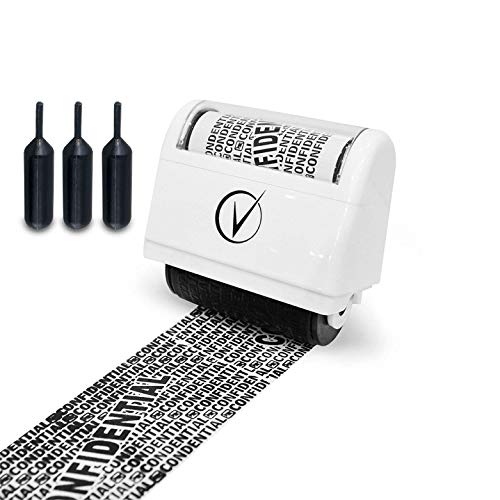
Punteha tried this style of roller stamp and found it to be so easy and quick to use. 'It made getting rid of sensitive paperwork so easy. One roll and the information underneath becomes completely illegible.'
2. Create a filing system
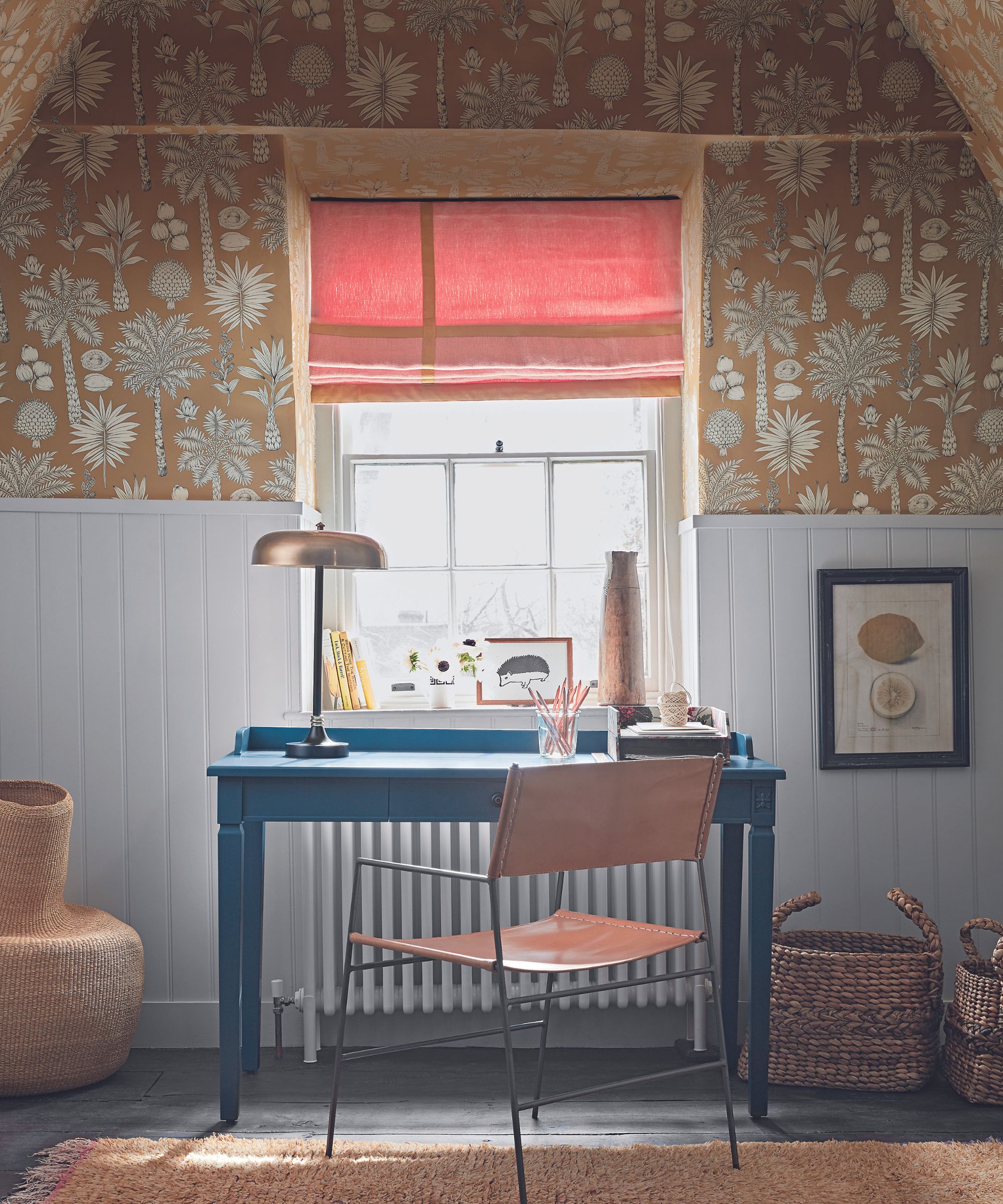
Whether you have a home office or simply keep your important paperwork in a drawer right now, it's time to create a filing system that works for you.
Tracy advises, 'If you are digitizing and it all goes on your computer with no system then it will become impossible to find later. I suggest coming up with a naming system that makes sense to you – vendor, year, month, something that is easy to remember, easy to replicate and you can use to search easily.'
Jenny Dietsch, chief executive organizer at Getting It Done Organizing explains how she tackles paperwork, 'It’s best to be ruthless and create a system for the important papers you keep. The Container Store has great filing cabinets that are neutral enough for any office space, or easily fit in a hall closet for easy access. I also love their open-file boxes because they’re easy to tuck into a closet or cabinet and pull out when needed. You can add labels to your folders and more bins for different categories.'
Check out Jenny's recommendations below, each have their place and will help with creating a system for your important documents.
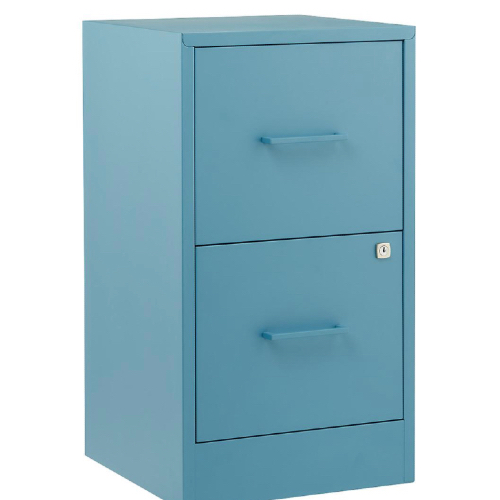
The beauty of this cabinet is that it's secure, solid and has smooth ball-bearing drawer glides and color-matched drawer pulls. It also comes in seven colors. There's enough storage space for all of your personal and family documents, and you can customize the drawer handles.
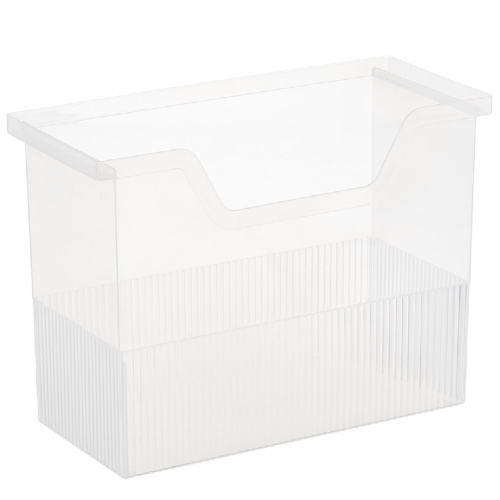
This box is really versatile for any type of document organization. The translucent design ensures you can view the contents easily and it will protect contents from moisture and spills. Ideal for documents as the size is a prefect fit for files.
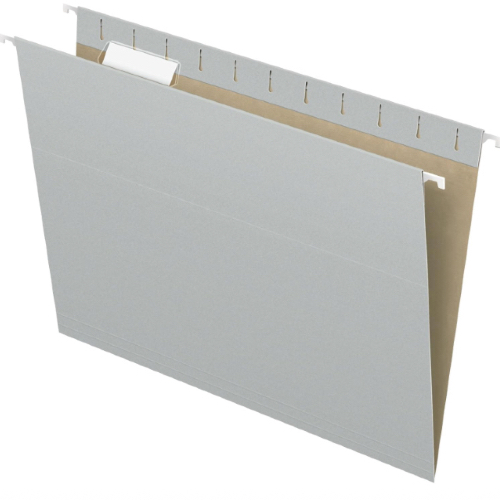
Keep your paperwork in order with these colored folders that are made from 100% recycled fiber with 60% post-consumer fiber. There are 11 colors to choice from and there's 25 in each pack. You get a printable label sheet and 25 1/5 cut tabs.
3. Dispose of what you don't need
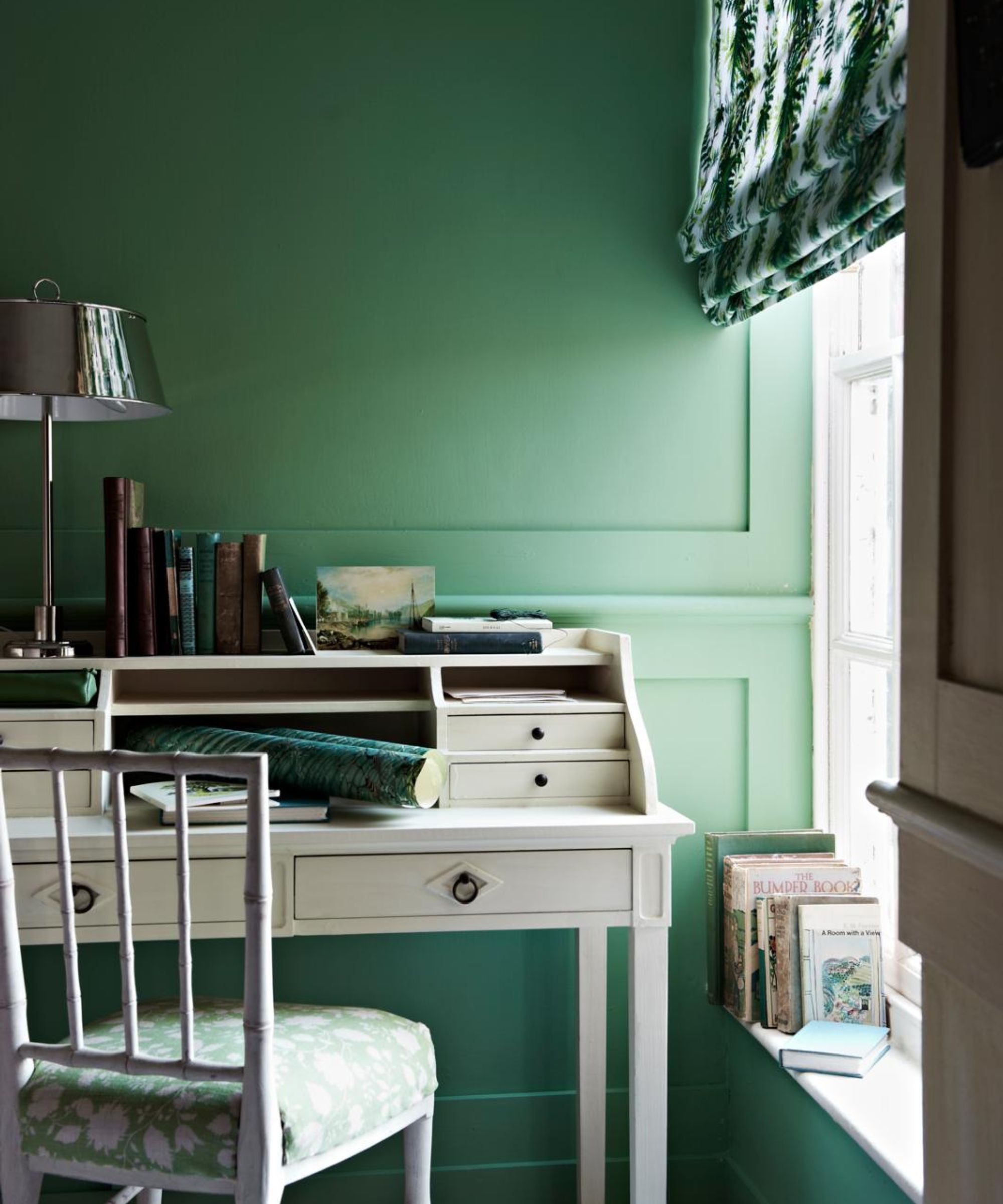
Disposing of paperwork that you no longer need is an important task. It can be hard to know how to get rid of paper clutter, not only does it declutter your home office, but it destroys documents that could be used for fraud.
Tracy offers one solution, 'Buy a shredder! There is so much fraud that you should be shredding anything with an account number on it. I also suggest shredding all junk mail. It doesn’t have to be an elaborate shredder, something like this Amazon Basics cross paper and credit card shredder will work great and last a long time, it also meets security P-3 standards.'
'Consider taking mass paperwork to FedEx to be shredded – it's called FedEx Office shredding services and you can send old bank statements, financial records and more to them for safe disposal and you pay by weight. There are even mobile shredding services that will come to your house,' advises Jenny.
4. How to store the essentials

As well as the everyday admin and keeping on top of weekly and monthly sorting, there's the additional element of how to store those important documents that need to be kept safe at all times.
'Handle essential documents like birth certificates, marriage certificates, Social Security cards, home ownership papers, legal documents, passports, and automobile titles carefully,' advises Jenny.
Sierra says it's essential to protect these items, 'We know that disaster can strike at anytime. Protect the super important paperwork in a fire and water safe lock box, I like Amazon's SentrySafe black fireproof and waterproof safe that's also a file folder and document box, it comes with a key lock for security.'
Important documents are one of the items we strongly advise to never store in a basement or attic if those areas are not climate controlled in your home, as this leaves them at risk of mold, water damage or indoor pests.
If you are able to, you can back up your important documents digitally so you have two copies – one in the safe for example, and another online. 'Scan and create digital copies, organize and file them securely online,' says Jenny.
We like the Brother DS-640 compact color and monochrome mobile document scanner from Walmart as it has fast speed scans and you can take it to any room in the house.
5. Dealing with receipts

Receipts can generate a lot of 'paperwork' even in today's more digitalized world, and it's hard to know what to keep or bin.
Whether you receive them by hand or get sent them by email, what's the best practice in terms of storing them? We asked Tracy for her advice.
'As more people are living through natural disasters and losing their homes, it’s turning out that keeping receipts for larger purchases such as furniture and high value mattresses for example, are being asked for by insurance companies for receipts to process claims. More clients than ever are scanning receipts of higher value items and making a file on their computer called “home inventory” so then if anything does happen, they have all the receipts to submit.'
For receipts on smaller items that are not a tax write-off, there is no reason to keep them longer than the return policy. If they are deductible, then make a file called “Taxes” and dump all the applicable receipts in that file.
For those receipts that aren't sent by email, it's worth storing them in a box until you can bin them as they can often slip into the bottom of filing systems.
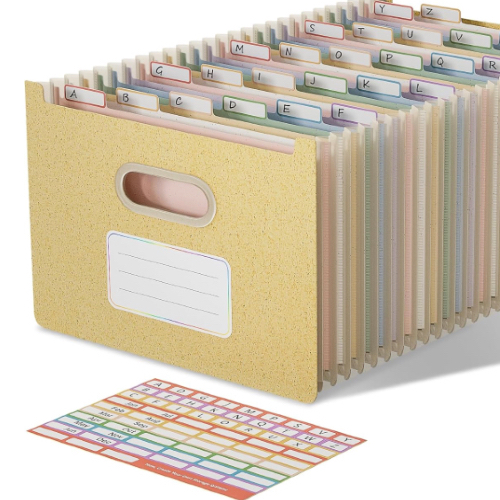
This highly rated accordion-style file organizer is designed for keeping receipts in. You can use the color labels for classification needs and the expanding design means it holds plenty of receipts until you can safely bin them. It's available in other colors.
6. Learn to maintain your new system

Maintaining the organization of your important documents will most definitely make your life easier moving forward.
Creating good habits is key, Sierra says it's best to tackle things in weekly and monthly chunks. 'For weekly – this is when you pay the bills, RSVP to the birthday party (and add the details to your calendar) and set aside the postcard for grandma. Use your file holder to separate what needs to be saved after you take action – invoices, sentimental items, or to mail. This needs to be done weekly so pick a time or day – I like Sunday mornings with my coffee – and stick to it.'
We like the Tasybox acrylic file holder from Amazon for those weekly 'to do's' – recommended by Sierra, the clear design ensures you can see your 'keeps' easily and the three sections can hold bills, important documents and letters.
Then your monthly organization task will be when you file the important documents that have accumulated. 'Put them in your file organizer with folders for categories like Kids, Pets, Insurance, House, Taxes. Make sure to recycle duplicates or old policy documents. When you can, go paperless to help go green and reduce your paperwork. Utilize a file organizer per year,' suggest Sierra.
Once you've established a good routine with organizing your important documents, a yearly check in for decluttering is a good method to adopts. Jenny explains, 'This means you'll continue to evaluate and toss out so you don’t accumulate a mountain of unnecessary documents. Reviewing a small box of papers now is more manageable than years of un-categorized papers later!'
If you want peace of mind for essential document storing Sierra says, 'To keep important family documents safe, consider consider a secure organizing system like Quicken's Lifehub or Trustworthy for all of your sensitive docs and data.'
How long should I keep my paperwork?
We all know that some important paperwork needs to be kept permanently, but other documents can be binned after a certain time. We asked David Hurless, director of operations at Stor-It for his advice, 'Not everything needs to be stored for the same amount of time. These are the suggested timelines that I try to stick by.'
- Bank statements: One year
- Tax returns: Seven years
- House deeds: Keep indefinitely
- Receipts: Keep for 1-3 months unless needed for tax purposes or warranties.
There are other documents that need to be kept for life too, Marina Alekseichik, product manager and sustainability strategist of iScanner says, 'For example, your Civil Registry Documents (passports, birth, marriage, divorce, and diplomas). At the same time, vehicle info (car title, repair receipts, loan payments, records of everything you've done such as oil change, maintenance) makes sense to keep only while you own the car and have not sold it.'
Meet our experts

Decluttering expert, author and speaker Tracy McCubbin is the CEO and founder of dClutterfly. Providing hands on experience for over 20 years, Tracy has helped clients create livable and organized spaces while her leadership and vision have been the company's internal compass.

Sierra is a digital organizing expert at Fairly Organize

Jenny Dietsch, founder and CEO of Getting It Done Organizing, is a wife, mother of three teens and lover of all things organized.

David is the director of operations at Stor-It and has been there for 17 years.

Marina Alekseichik works as a product manager & sustainability strategist of iScanner, the flagship app of BP Mobile (AIBY Group). This AI-based app became the People's Voice Winner at the Webby Awards and has achieved 100M+ downloads.
Although daunting, learning how to organize your important documents will save you time and worry when you need to find something. If you catch the 'sorting out' bug, why not declutter your home office at the same time?
Sign up to the Homes & Gardens newsletter
Design expertise in your inbox – from inspiring decorating ideas and beautiful celebrity homes to practical gardening advice and shopping round-ups.

Sophie has been an interior stylist and journalist for over 20 years and has worked for many of the main interior magazines during that time, both in-house and as a freelancer. On the side, as well as being the News Editor for indie magazine, 91, she trained to be a florist in 2019 and launched Flowers Inside My Head where she curates beautiful flowers for modern weddings and events. For Homes & Gardens, she writes features about interior design – and is known for having an eye for a beautiful room.
You must confirm your public display name before commenting
Please logout and then login again, you will then be prompted to enter your display name.
-
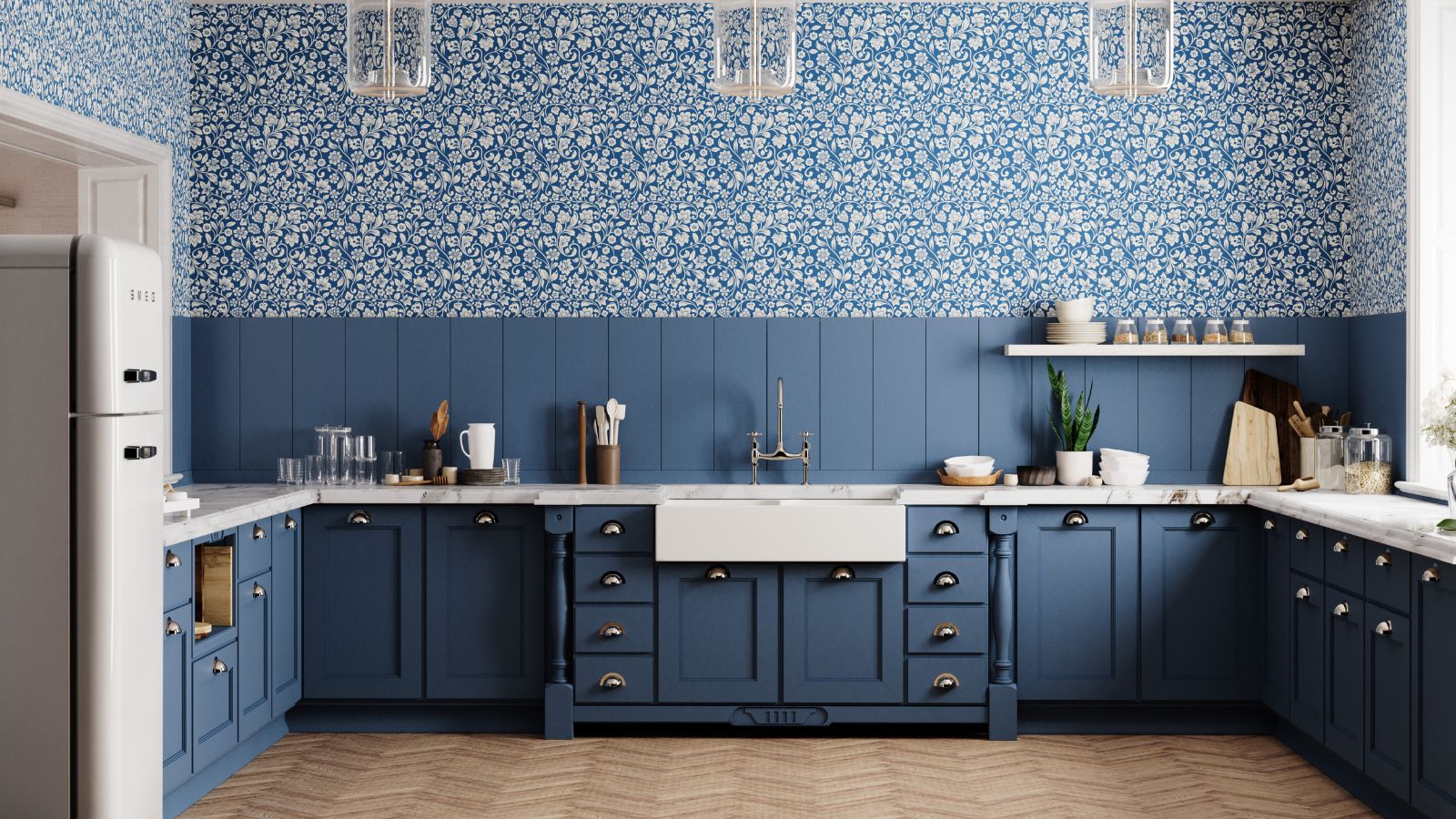 Do cleaning products expire? Professional cleaners warn time could make them ‘less effective, and in some cases, irritating to use’
Do cleaning products expire? Professional cleaners warn time could make them ‘less effective, and in some cases, irritating to use’For the best results, it pays to stay on top of the timeline of your cleaning products
By Chiana Dickson Published
-
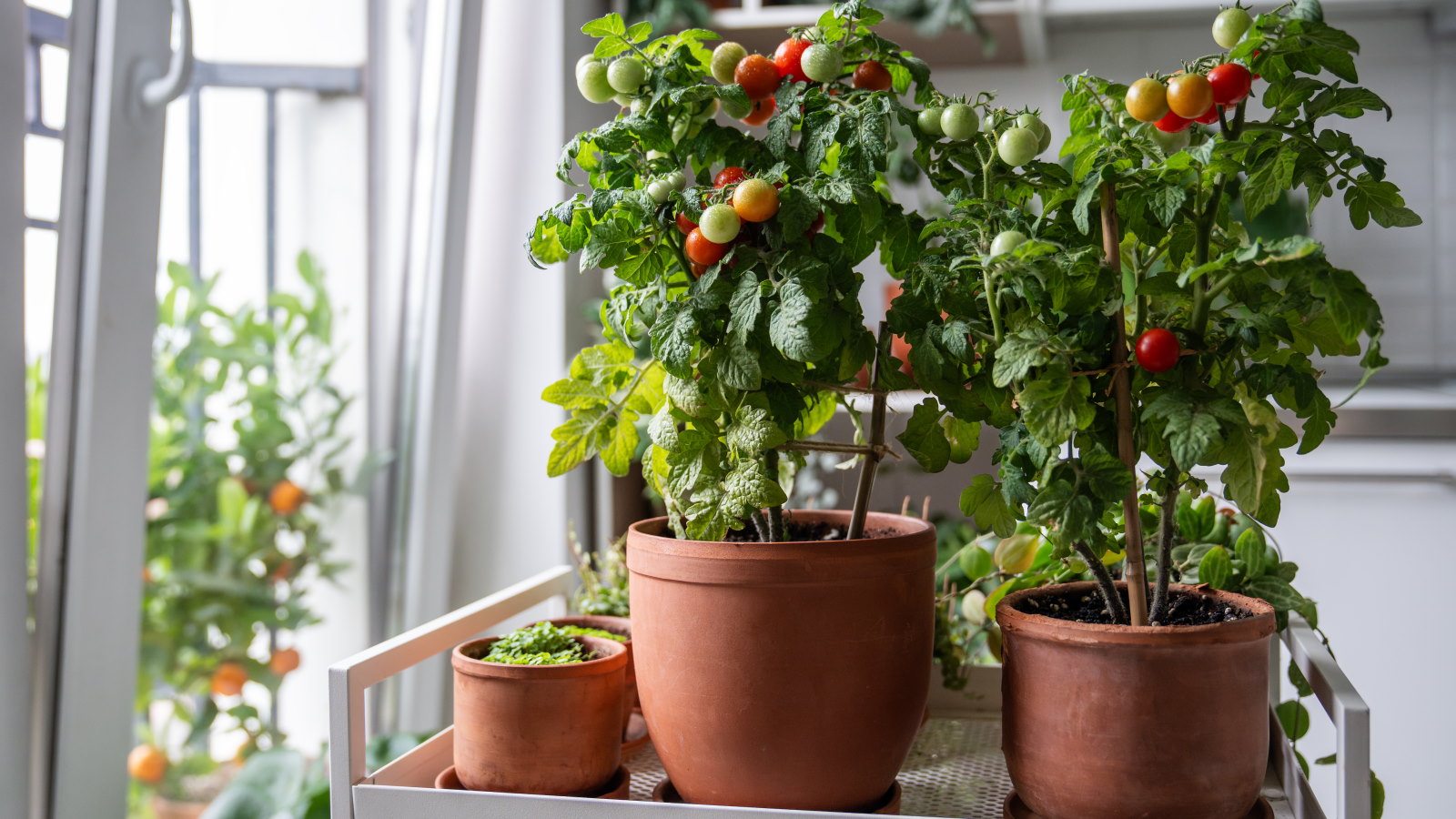 7 of the best tomatoes for growing in pots - expert growers pick their top varieties ideal for large harvests from containers
7 of the best tomatoes for growing in pots - expert growers pick their top varieties ideal for large harvests from containersYou can enjoy bumper homegrown harvests in small spaces
By Drew Swainston Published
-
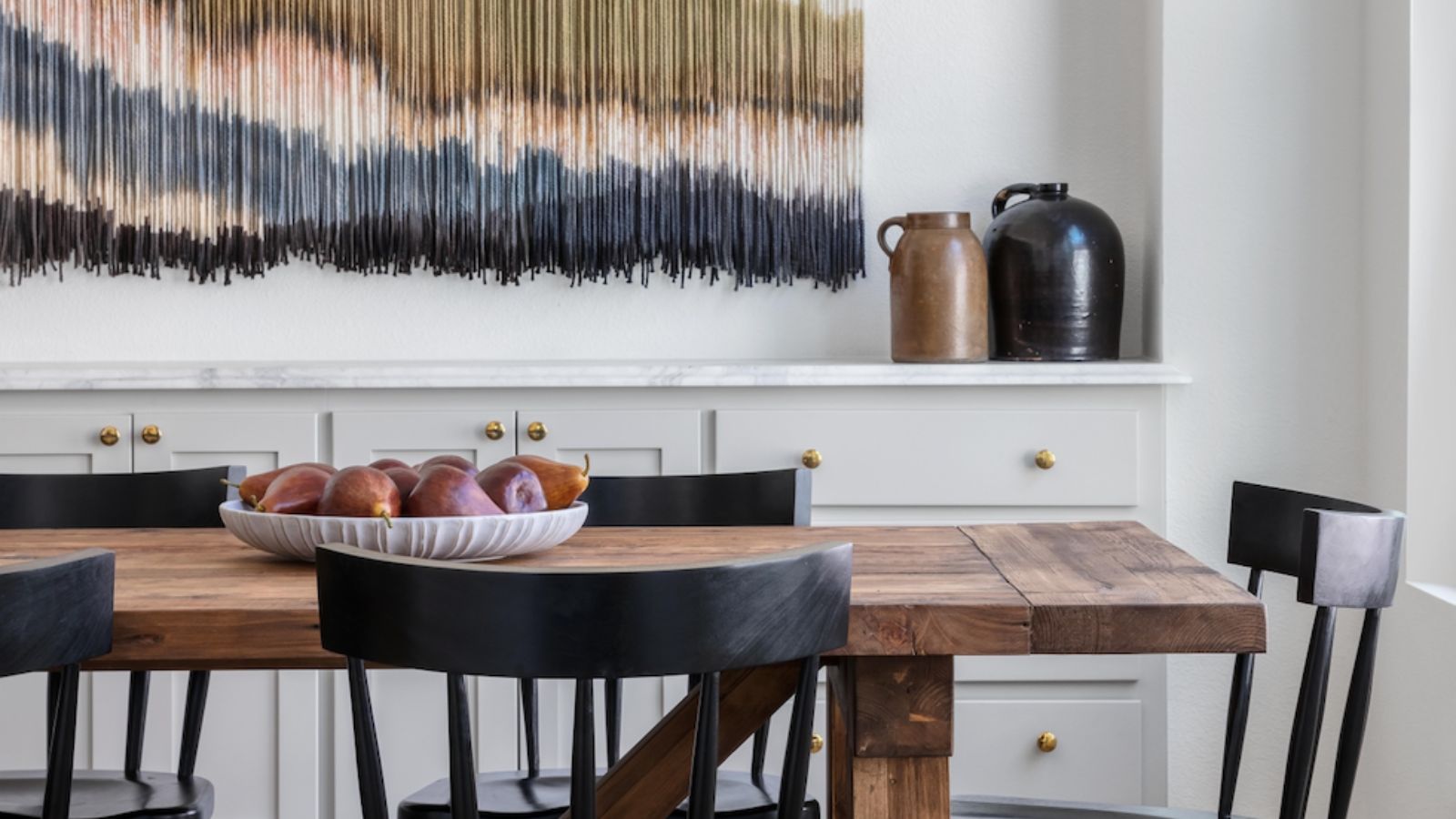 How the 'ODT' method can help you to tackle your overwhelming decluttering checklist – and streamline the process from start to finish
How the 'ODT' method can help you to tackle your overwhelming decluttering checklist – and streamline the process from start to finishAvoid 'analysis paralysis' and tick off tasks quickly and easily by making just one decision at a time
By Ottilie Blackhall Published
-
 I gave the ‘try-for-five’ method a go in my small home – it's a brilliantly easy way to beat chore procrastination in seconds
I gave the ‘try-for-five’ method a go in my small home – it's a brilliantly easy way to beat chore procrastination in secondsThis method is great for those with executive dysfunction
By Chiana Dickson Published
-
 'It's a fast reset button' – using the 1, 2 ,3 ,4, 5 decluttering method cleared my persistent mess in seconds
'It's a fast reset button' – using the 1, 2 ,3 ,4, 5 decluttering method cleared my persistent mess in secondsIt's easy, effective and so quick to do
By Ottilie Blackhall Published
-
 This simple closet swap doubled my cramped hanging space – professional organizers swear by it too
This simple closet swap doubled my cramped hanging space – professional organizers swear by it tooVelvet hangers have transformed my closet
By Eve Smallman Published
-
 I tried the 'GFD' basket tidying trick ahead of hosting – it was a last-minute clutter-busting savior
I tried the 'GFD' basket tidying trick ahead of hosting – it was a last-minute clutter-busting saviorThis quick clean-up fall-back saved my game night
By Chiana Dickson Published
-
 I tried the 'Reverse Decluttering' method – it made clearing clutter in my small home stress-free, speedy and guilt-free
I tried the 'Reverse Decluttering' method – it made clearing clutter in my small home stress-free, speedy and guilt-freeIt's a simpler way to cut clutter
By Chiana Dickson Published
-
 'They all feel chaotic’ – 6 things that make a room look really messy and what to do for an instant lift
'They all feel chaotic’ – 6 things that make a room look really messy and what to do for an instant liftEasily make your home less stressful by fixing these common faux pas
By Chiana Dickson Published
-
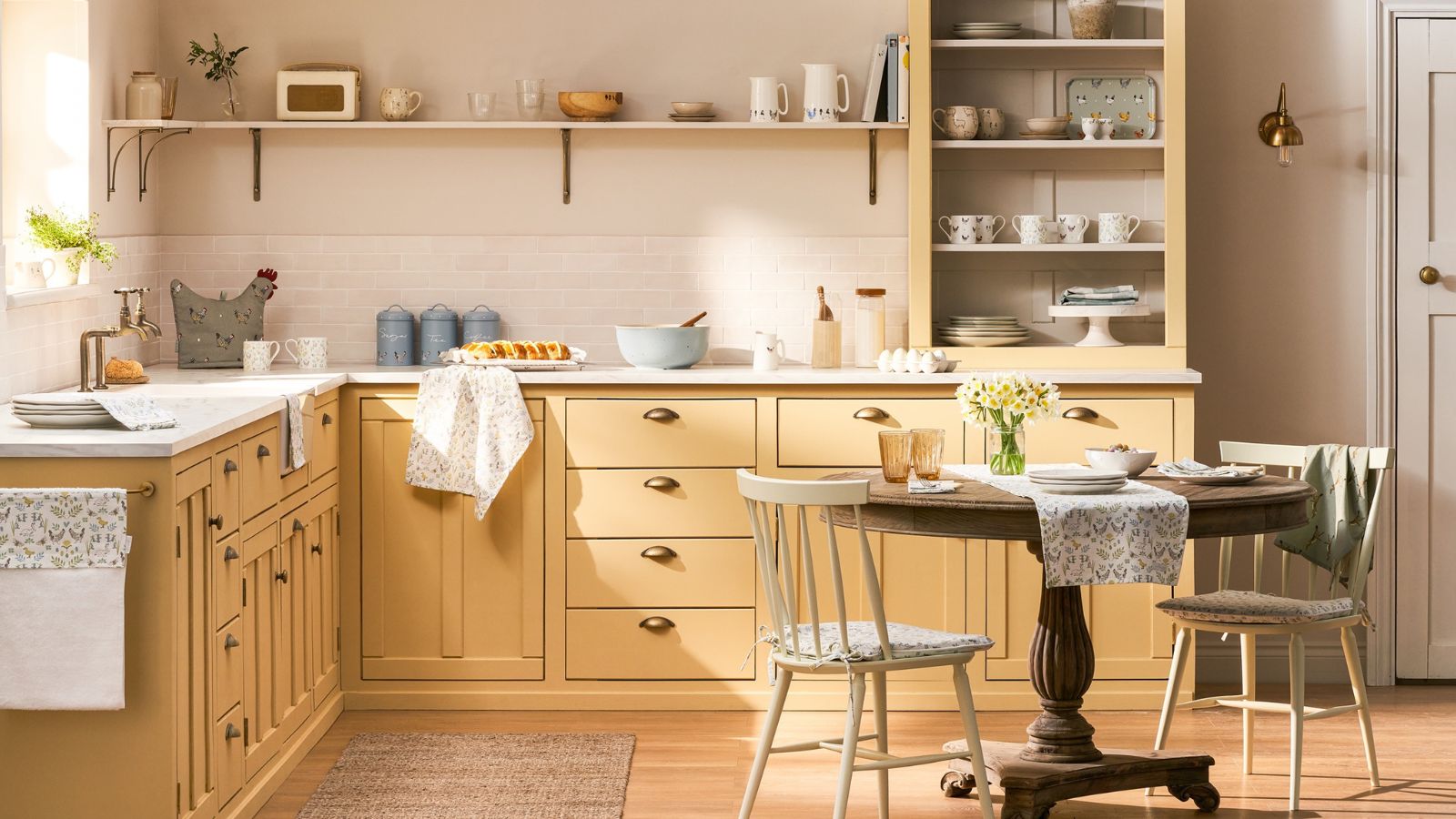 9 things you need to declutter in April 2025 – tossing these need-to-go items will maximize your space this spring
9 things you need to declutter in April 2025 – tossing these need-to-go items will maximize your space this springSay goodbye to winter clutter by clearing out lingering items
By Chiana Dickson Published